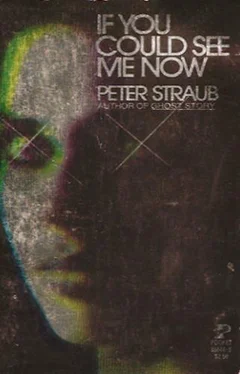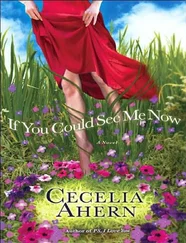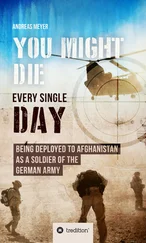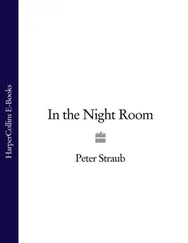So, like I said, I saw the girl leave his house that morning just when I was walking up the road. I says to myself, you’ve been where you shouldn’t be, little girl, and I stayed out there on the road a little bit so he wouldn’t know I saw, and when he sent me up to change his sheets I knew just what they’d been up to. You can lie all you want to, and some do, but you can’t fool the person who washes your sheets.
I made up my mind I’d talk to Red. I knew sure as shooting that he’d get real mad, but I wanted him to decide if we should tell Duane. He’s the man now.
Half a dozen times that day I nearly left, got into the car and took off for someplace — it did not matter where. But I still did not have my car and I still thought there might be other explanations than the one which had leaked into my consciousness on the night when I had looked through the window of my room and seen that slight figure blasting cold jealous energy at me from the edge of the woods. That was when the conscious fear had started.
And it remained, refusing to be salved by theories. It followed me downstairs and upstairs, it was with me while I bolted my food, and when I sat and wrote, it stood behind me, sending its chill straight through my clothing.
She is your snare, Aunt Rinn had said. All of my life had demonstrated the truth of that statement.
Which put me where I had started, with the overwhelming memory of the terror I had felt, that night in the woods. I tried to reconstruct those moments. Later, I had explained it to myself as a fantasy cooked up out of literature, but at the time — that was important, at the time I had sensed nothing literary but instead the pure and overwhelmingly terror of evil. Evil is what we call the force we can discover where we send our minds as far as they can go: when the mind crumbles before something bigger, harder than itself, unknowable and hostile. Had I not courted that evil, by willing my cousin back into life? She did not promise comfort, I knew, thinking again of the figure at the edge of the fields; she did not promise anything I could comprehend.
I still could not admit to myself what I had begun to imagine. That night, the night which changed everything, began calmly enough, in the manner of most of my evenings. I had half-heartedly munched an assortment of things in the kitchen — nuts, a couple of limp carrots, some cheese — and then wandered outside onto the lawn. The night was warm and full of the scents of hay and mown grass, and I could hear crickets chirruping and invisible birds lifting off the walnut trees. I rubbed my face and went down to the road. I could not see the woods, but I knew they were there. From the center of the warm night, an icicle of cold reached out to touch my face. Now that the inhabitants of Arden and the valley had decided that I was innocent of the girls’ deaths, I felt more watched, more under observation, than ever before.
I thought of the twigs in my bed, and went back up the drive.
I pulled my chair up to the desk. Mechanically, I began to resume writing. After some minutes I became aware of an intensification of the atmosphere: the air in the room seemed charged, crowded with unseen activity. The overhead light appeared to waver, darkening my shadow on the page before me. I blinked and sat up straight. I could smell cold water all about me.
A palm of cold wind struck the pencil from my hand, an elbow of wind cut into my body.
The light darkened as my shadow had, and I was immediately aware of Alison’s presence fighting to enter me. My face and hands were icy. I tipped backwards in my chair, windmilling my arms. She was coming in through nose and eyes and mouth; I screamed with terror. A stack of paper shot up into the air and fragmented. I felt my mind become elastic, skidding, stretching out of my control. She was within my mind, within my body: beneath my animal terror, I felt her hatred and jealousy. My feet kicked out at the desk, and the door racketed away from the trestles. The typewriter thudded to the ground. My head struck the wooden floor. When my right arm found a stack of books, they geysered up into the air. I felt her hatred on all my senses: the darkness, the burning cold of my mouth and fingertips, the flooding smell of water, a rushing noise, the taste of fire: in my mouth. It was punishment for the last sad copulation, that spiritless animal joining. She was boiling within me, and my arms thrashed and my back arched and slammed against the wood. I sent papers flying toward the window, toward the lightbulb. My body was sent rolling across the floor. Saliva, mucus, tears slid across my face. For an instant I was above my body, seeing it thrashing and writhing across the littered floor, watching my slimed face contort and my arms hurling books and papers, and then I was back in the boiling, thrashing mess, suffering like an animal in a fit. Her fingers seemed slipped into mine, her light, violent bones overlay mine.
My ears were pressed forward, fluid filled my nose, my chest burst.
When my eyes opened it was over. I heard myself panting, not screaming. I had not sensed her leaving, but she had left. I was looking at a quiet edge of the moon through the window above the toppled desk.
Then my stomach violently unlocked itself, and I barely made it downstairs in time. A bitter brown colloidal juice shot upwards into my mouth. At that moment I was seated on the toilet, feeling watery liquid expel itself from the other end of my body with an equal force, and I turned my head toward the sink, my eyes closed and a sickly perspiration blossoming on my face.
When I came limply out of the bathroom into the kitchen I had to support myself by leaning against the sink as I drank glass after glass of cold water. Cold water. The smell pervaded the house.
She wanted me dead. She wanted me with her. On that night which seemed a century ago, Rinn had warned me. She means death .
And the other things — the girls’ deaths? I looked that dread in the face, fully, for the first time. I sat in the room I had labored to prepare for her and numbly tried to accept what I had refused to think about before: the other possibility I had mentioned to Polar Bears. I had awakened Alison’s spirit, that terrible force I had felt in the woods, and I knew now that spirit was rancid with jealousy of life. On the twenty-first she would appear — and would have anyhow, I now saw, even if I had not worked at reconstructing the old interior of the farmhouse — but as the date drew nearer, she was growing in strength. She could take life. That, she had been able to do from the day I had begun to draw near the valley.
I sat in the cold room, paralyzed straight down to the core. Alison. I thought: the twenty-first begins at midnight on the twentieth. One day away from the day just beginning to appear in stripes of dark purple over the woods blackening the hills.
As the morning drew closer I moved out onto the porch. The bands of purple increased in width; the wide fields, striped yellow and green, grew in visibility and detail. Fog lay upon them in trails of misty gray, wisps of cotton snagged in the corn.
Footsteps awoke me. My hands and feet were cold. The sky had become a flat uniform pale blue, and the mist was gone from everywhere but the very edges of the woods. It was going to be one of those days when the moon is visible all morning, hanging in blue sky like a white dead stone. Tuta Sunderson was coming heavily up the drive, trudging as though her shoes were encased in concrete. Her bag jigged at her side. When she saw me, her mouth clapped shut and her face hardened. I waited for her to open the screen door and come onto the porch.
“You don’t have to come here any more,” I said. “The job is over.”
“What do you mean?” I could see suspicion darken her goggling eyes.
Читать дальше












